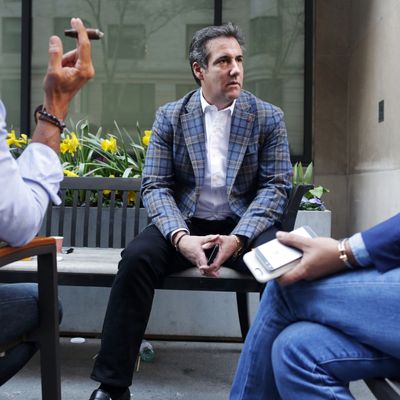
The most shocking-but-not-surprising aspect of James Comey’s account of meeting Donald Trump is the ease with which he drew upon his experience prosecuting organized crime. Meeting Trump, he told George Stephanopoulos, “I had a flashback to my days investigating the Mafia, La Cosa Nostra.” Trump’s leadership style eerily tracked that of the mob bosses he had studied. “There’s an expression in the Mafia — there’s a distinction between a friend of yours and a friend of ours. A friend of yours is someone on the outside of the family, a friend of ours, an ‘amica nostra’ is the way they talked about it in Sicilian, is part of the Family, capital F.”
It is a pure coincidence, but a revealing one, that Comey’s story has come out at the exact same time that Michael Cohen has emerged as a first-tier, and perhaps pivotal, figure in the prosecution of Trumpworld. Cohen has called himself Trump’s consigliere and is the most palpably moblike character in Trump’s orbit. The severe legal risks he poses to Trump help recenter the story as a mafialike drama that owes as much to The Sopranos as The Americans. Organized crime is somewhere between a metaphor for the ethos that Trump has imposed upon his world and a literal description of the way his business operates. The investigation of Cohen, in particular, will reveal just where along that continuum the truth lies.
One of the ways in which Trump’s business closely resembles organized crime is that, because it relies so heavily on morally and legally dubious business ventures, its human-resource strategy deemphasizes qualifications and relies heavily on loyalty. Or, to put it differently, a person’s willingness to engage in, and keep one’s mouth shut about, Trump’s dubious activities is the most important qualification. This explains why Trump is not known for hiring bright young minds from leading business schools and relies so heavily on his children, as a mafia boss would. It also explains why he retained the legal (or quasi-legal) services of Michael Cohen, a graduate of the worst law school in the United States.
It was immediately evident that the FBI raid on Cohen’s home and office posed a major and novel threat to Trump. Unlike a lot of hyperventilated insta-reactions to breaking news, in this case the instant reaction may have understated things. Cohen has involved himself in a wide array of shady activities, ranging from business deals involving Russia and/or underworld financing sources to paying off women Trump had sex with or sexually harassed. Cohen has compared himself to Tom Hagen, but lacks Hagen’s subtlety. (Hagen would not utter a threat such as, “I’m warning you, tread very fucking lightly, because what I’m going to do to you is going to be fucking disgusting.”)
There is no question that Trump would pardon Cohen of any federal charge. But that still leaves many open channels through which Cohen’s troubles could implicate Trump. One is that physical evidence seized from Cohen could implicate his boss. Reportedly, Cohen kept recordings of his conversations, and legal mistakes like this are the sort of risk you run when you scour America’s worst law schools for talent.
A second risk is that Cohen might be vulnerable to prosecution for state crimes — and remember, a president can only issue pardons for federal crimes. Numerous media reports have mentioned Cohen’s involvement in the taxi business, and while none of these reports have alleged a crime, the implication is that it is a rough business. Any crime he may have committed in that line of work could be prosecuted by state authorities, and Trump could not pardon him. The same would hold true if it could be established that he had some involvement in, say, threatening harm to Stormy Daniels.
Trump has run his business like a mafia operation because maintaining secrecy is the paramount value. Despite the vast trove of public access to Trump’s endless public statements and colorful marital life, a huge amount of his work remains shrouded in secrecy, from his ties to La Cosa Nostra in the New York real-estate world to his casino business in Atlantic City, to his overseas business dealings and the tax returns he refuses to disclose. Mueller’s investigation probably will not result in the literal end of Trump’s presidency. (That would require 67 Senate votes to impeach, a highly improbable outcome.) But it will probably reveal whether he has run his business merely like a crime family or literally as one.






























